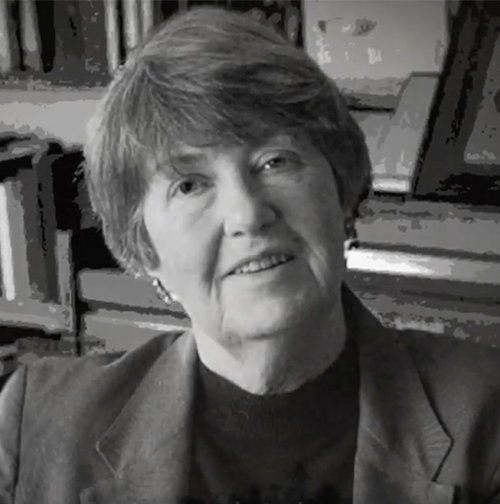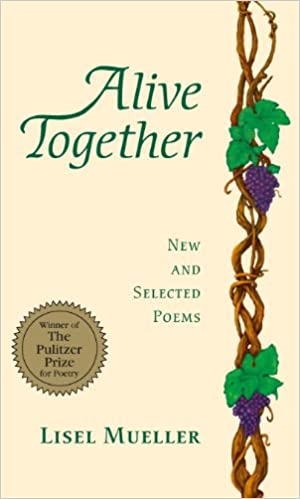"Poems seem to strike me like lightning, or rather the idea for a poem. And I never know where they come from and I never know when they come. It’s always a matter of something connecting with something else. You know, seeing something, hearing something that at another time would not have meant anything, it would have just been a mundane experience. But for some reason or another at that particular moment I see it as something new, I see it as connecting with something else and therefore making a new idea, a new way of seeing it, a new perception."
When poet Linda Nemec Foster established the Lisel Mueller Scholarship in 2000, her intent was not only to support writers who showed promise, but to enable parents balancing childcare with the hard, solitary work required to create art. Foster knew Mueller first as a mentor then a friend, starting at Goddard College’s low residency MFA program. Foster’s friendship with Mueller deepened over the years and the two remained close the remainder of Mueller’s life. The MFA program started by Ellen Bryant Voigt in 1976 moved from Goddard to Warren Wilson in 1981.
“I was so impressed with how Lisel was able to write her poetry, have two daughters, a husband, and a life,” Foster said. “The Lisel Mueller Scholarship in her honor is given to a writer who has small children, to give them a boost, including financial assistance for childcare. Its intent is practical. Lisel was everything I would want a mother and poet to be.”
The brilliant poetry that would eventually define Lisel Mueller’s legacy did not enter her story until around 1953, when at the age of 29 her mother’s death provided the “emotional catalyst” for her to begin serious writing. It would be another dozen years, 1965, until Mueller, then 41 years old, published her first poetry collection. That foreshadowed three-and-a-half decades as one of America’s finest and most important poets.
Mueller was born Elisabeth Neumann in Hamburg, Germany. In the summer of 1939, just before Hitler’s invasion of Poland ignited World War II, Lisel, then 15, fled Germany with her family. They took refuge in the American Midwest. Her father, Fritz Neumann, a political dissident, had already left Germany and secured a professorship at Evansville College (now Evansville University). Lisel soon enrolled as an undergraduate at Evansville College, where she read the poetry of John Keats and also met classmate Paul Mueller. The two married in 1943. After receiving a bachelor’s degree in sociology the next year, Mueller and her husband did graduate work at Indiana University. Their post-graduate employment, he as editor for legal publisher Commerce Clearing House, she as a social worker and librarian, took them to the Chicago area. Mueller, in those early days, also reviewed poetry for the Chicago Daily News and later Poetry magazine. They lived their first decade in Evanston, some of that time on Crain Street, before moving in 1959 to a Lake Forest home. There, they would reside the next four decades until poor health required their move to senior living facilities.
“I think having come to the U.S. as a young woman, from the horrors of World War II, in Germany especially, she had a way of looking at American life that most American born poets don’t,” said poet Reginald Gibbons. “She had as a backdrop the worse circumstances that human beings could create. She was not a tragic poet at all. But underneath it all there was that basement of memories and knowledge of cataclysm.”
Mueller’s work, often in short, lyrical form, is imbued with a sense of history, as well as the folk and fairy tales she studied as a graduate student. In a Dec. 4, 1993 article called “Bringing It All Together” Mueller told the Chicago Tribune’s Karen DeBrulye Cruze, “I write a lot of poems that have tension between what is going on now in society and what has always been there. My poems are much concerned with history. The message is obvious. My family went through terrible times. In Europe no one has had a private life not affected by history. I’m constantly aware of how privileged we (Americans) are.”
Though the Muellers had a Lake Forest address, they were almost equally close to Libertyville and Vernon Hills. Their North Shore home, just 35 miles northwest of Chicago, was much more rural than suburban. Their subdivision, called Forest Haven, was located off Bradley Road in an unincorporated area. Her address was 1590 Longwood Rd. for those many years, though the houses in the subdivision, including hers, later got renumbered. Her youngest daughter Jenny recalls that during her childhood Lisel did not have a dedicated writing space, though at one point she worked in the basement and eventually converted a second-floor room to her studio. Mueller famously spoke about the moo of her neighbor’s Holstein cows serving as a kind of alarm clock.
When Mueller moved to this one-acre lot abutting a sprawling 200-acre estate her “consciousness changed.” The setting included woodland in the back, a swimming pond, a vacant lot, a gentleman farmer who raised thoroughbred horses and even camels, a spectacular display of flora, and a large variety of wildlife like frogs and salamanders. She told Folio Press, “…after 40 years in this house I know what time of day it is by the way the light slants. I am intimately familiar with the names and habits of the wildflowers and the birds that live in our hawthorns and aspens. We all live together, in the world and in my poems.” It’s no wonder that her poems teem with images of the natural world and what she called “the indifference of nature” in the face of human suffering.
The Mueller house boasted an extensive library, especially poetry books, not just in a dedicated room but in the dining room, living room, bedrooms--all over the house. “My mom and dad were both big readers,” said oldest daughter Lucy. “Somebody once came to the house and said, ‘You better get rid of all those dust catchers.’ That’s what they called the books. We used to laugh about that all the time.” There were plenty of excursions to Chicago, especially for cultural experiences like the Field Museum, Lincoln Park Zoo, Steppenwolf Theater and the Shedd Aquarium. The family often visited Evanston, where close family members on both sides lived. But the Lake Forest home was largely the setting in which Mueller thrived as an artist.
“It really is amazing how she just embraced the world,” said Foster, who has now published 12 poetry books of her own, including The Blue Divide (2021), which is dedicated to Mueller. “If she heard something or read something that struck her, then she would begin to process. Classical music, modern music, classical art, contemporary art, politics, history…she would write from those interests, from her wide knowledge and her wide reading.”
Foster counts as one of many poets that Mueller taught, not only at the Goddard and Warren Wilson low residency programs but also some at Elmhurst College and the University of Chicago. Ed Roberson, now a celebrated poet, was another. He’d published two books of poetry before hopping a bus to Goddard, where Mueller accepted him as a mentee. In addition to the time spent on campus, Mueller later helped Roberson through frequent critiques and advice over the phone and through the mail. “Lisel, she is one of the folks who kept me writing,” said Roberson. “She hit me at a crucial time in my writing--it was my third book, Lucid Interval. That was the book, I just let loose. Lisel talked me through that thing. It was kind of a bad time in my life, I had gotten a divorce and lost custody of my daughter. She got back to me every time I sent her something. She’d say, ‘I don’t understand exactly what’s happening, but go on. Try this, do this.’ I was writing all this wild off-the-wall stuff, that’s when my real writing started. That whole year, we’d go on, and she helped get me through that whole book.”
Mueller was also an institution builder. She was one of the founders of the Chicago Poetry Center and an important early advocate of the Ragdale residency program.
The Poetry Center, of course, regularly brought Mueller to Chicago proper, as did other appearances and leisurely visits to the Art Institute, which features in several of her poems. She’d gotten to know Chicago intimately as a case worker in her post-graduate years, as well as her work for the Chicago Daily News. “For many years, she traveled through Chicago meeting her clients,” Foster said. “She knew the streets of Chicago like the back of her hand. She was like a roadmap before GPS. When we’d be traveling into the city, she would know the area, the neighborhood, street names—she still remembered this gridwork of streets in Chicago.”
Mueller’s poems generally are not place specific, though some, like her famous poem, “When I Am Asked” certainly locates in her Forest Haven backyard; others clearly take place in Chicago, like the prose poem “Triage.” The latter poem includes the lines, “Walking past a stand of tall, still healthy elms along/Chicago’s lakefront, I think of what Brecht said.” In “Identical Twins,” the narrator studies her own face in the window of a subway.
“She wrote constantly of the role of history in her life and times, and also drew from her immediate surroundings,” said daughter Jenny, author of the poetry collections Bonneville and State Park. “I do recognize the world of her poems and know that was the world I grew up in. She wrote a great deal about her family. Towards the end of his life my grandfather was too ill to live with his wife in Germany and came to live with us.”
Starting in 1965 with her debut collection Dependencies and through the 1996 Pulitzer Prize-winning compendium, Alive Together: New and Selected Poems, Mueller published nine volumes of poetry as well as two books of translation. Among those titles was the National Book Award-winning The Need to Hold Still (1980). Mueller’s first major award came a decade after her first publication, when at the age of 57 she won the Lamont Poetry Prize for The Private Life (1975). Mueller would go on to capture a Carl Sandburg Award (1990), a National Endowment for the Arts fellowship (1990), a Ruth Lilly Poetry Prize (2002), and an Order of Merit of the Federal Republic of Germany (2019). In 1981, during the Carter administration, she attended an evening of poetry at the White House.
The Pulitzer jury wrote that Alive Together was “a testament that invites readers to share her vision of experiences we all have in common: sorrow, tenderness, desire, the revelations of art, and mortality — ‘the hard, dry smack of death against the glass.’”
Former Poetry magazine editor Don Share said in an interview that Mueller was “everything a poet could aspire to be: She hit all the right notes, and did so with grace, heart and wit. American poetry today focuses on such matters as privilege, the drama of everyday life, nature and also war, and she helped create the language in which we write and think about these important subjects.”
The MFA Program for Writers at Warren Wilson College awards its Lisel Mueller Scholarship annually, a perpetual reminder of the poet’s lasting legacy.
read less









